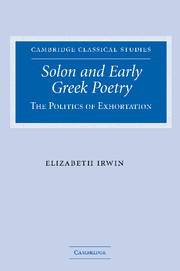Book contents
- Frontmatter
- Contents
- Acknowledgements
- List of abbreviations and editions
- Introduction
- PART I THE POLITICS OF EXHORTATION
- PART II POLITICAL POETICS: SOLON'S EUNOMIA
- PART III POETRY AND POLITICAL CULTURE
- Conclusion
- Appendix I Who were Tyrtaeus' gymnetes?
- Appendix II λυκάβαντος: when the wolf comes?
- Bibliography
- General index
- Index locorum
Introduction
Published online by Cambridge University Press: 05 November 2009
- Frontmatter
- Contents
- Acknowledgements
- List of abbreviations and editions
- Introduction
- PART I THE POLITICS OF EXHORTATION
- PART II POLITICAL POETICS: SOLON'S EUNOMIA
- PART III POETRY AND POLITICAL CULTURE
- Conclusion
- Appendix I Who were Tyrtaeus' gymnetes?
- Appendix II λυκάβαντος: when the wolf comes?
- Bibliography
- General index
- Index locorum
Summary
In the late sixth century, Heraclitus could call Hesiod ‘the teacher of most men’ (διδάσκαλος δϵ´ πλϵίστων, 57 DK). Xenophanes could speak similarly of Homer (ϵ ᾽ξ ἀρχη∩ς καθ' Ὅμηρον ϵ ᾽πϵὶ μϵμαθήκασι πάντϵς, ‘From the beginning all have learned according to Homer’, 10 DK) and, moreover, criticise Homer and Hesiod for attributing to the gods ὅσσα παρ' ἀνθρώποισιν ὀνϵίδϵα καὶ ψόγος ϵ ᾽στιν (‘however many things that among men are a source of censure and reproach’, 11 DK); no doubt the detrimental effects such stories had on human behaviour played no small part in this critique. A century later, Herodotus tells us that Cleisthenes, the archaic tyrant of Sicyon, brought an end to rhapsodic performances of Homeric epic because of its excessive praise of the Sicyonians' enemies, the Argives: ῥαψῳδου´ς ϵ ῎παυσϵ ϵ ᾽ν σικυω∩νι ἀγωνίζϵσθαι τω∩ν Ὁμηρϵίων ϵ ᾽πϵ ´ων ϵἵνϵκα, ὅτι Ἀργϵι∩οί τϵ καὶ Ἀργος τὰ πολλὰ πάντα ὑμνϵ ´αται (‘he suspended the rhapsodic contests in Sicyon, because they involved the Homeric epics, which constantly celebrate Argos and the Argives’, Hdt. 5.67.1). Finally, Aristotle demonstrates the selection process involved in how a great majority of the fragments of archaic poetry – especially those of Solon – have come to survive, ϵἵλοντο κοινη∩¸ διαλλακτη´ν καὶ ἄρχοντα σόλωνα, καὶ τη´ν πολιτϵίαν ϵ ᾽πϵ ´τρϵψαν αὐτω∩¸, ποιήσαντι τη´ν ϵ ᾽λϵγϵίαν ς ϵ ᾽στιν ἀρχή … (‘They agreed to choose Solon as an arbitrator and archon and they entrusted the political system to Solon, who wrote the elegy of which this is the beginning …’, Ath. Pol. 5.2).
- Type
- Chapter
- Information
- Solon and Early Greek PoetryThe Politics of Exhortation, pp. 1 - 14Publisher: Cambridge University PressPrint publication year: 2005

